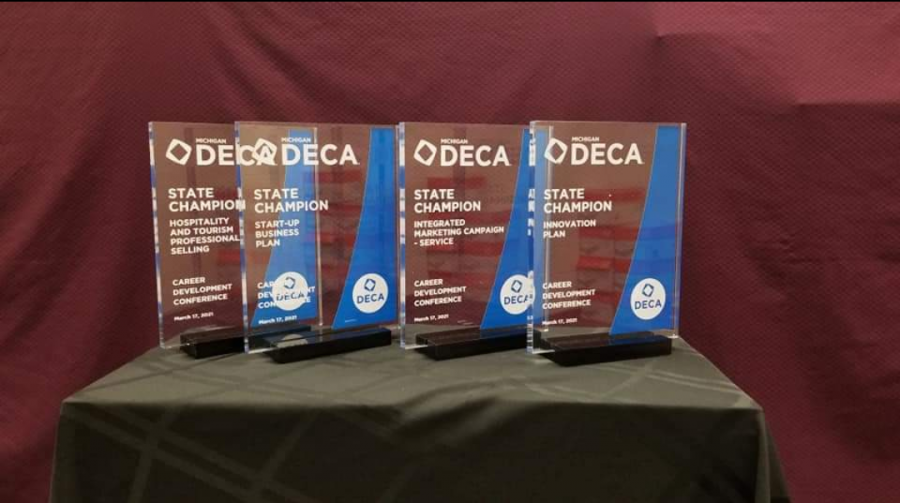Virtual DECA States, MHS students achieve success
Many DECA members won medals for their achievements, and state champions won DECA glass to commemorate their achievement and potential to compete at the international level (Photo courtesy of Kaye Sommer).
April 11, 2021
More than a year ago, the way in which we navigate everyday occurrences was altered by COVID-19: Early March 2020 marked the last time period of normalcy for Michigan DECA as it maintained an in-person competition at TCF Center in Detroit. This year, however, all competitions, including at the state level, have been virtual; from March 8-12, students across the state participated in a virtual series of events. Competitors not only presented their skillsets before judges, but also could partake in many chapter bonding and growth activities virtually, such as games and future development discussions with peers. Though it had its drawbacks, the virtual competition offered ‘firsts’ for students that may be beneficial in their careers: “Students were provided opportunities that most high school students do not get–interview online for a job or internship,” Milford DECA Advisor Kaye Sommer shared. “This opportunity helped everyone grow and learn how the new business world may operate.”
The awards ceremony, traditionally hosted on the last day of in-person competition in Detroit, took place on March 17: MHS’ chapter received 24 medals, with one test finalist, one roleplay finalist, 13 event finalists, and 10 International Competition qualifiers.
Despite Milford’s successes in the newly-designed version of the competition, many felt that the event itself was dispassionate in nature. “It was sad not being able to compete in person and experience everything that we normally would with states, but it still felt good to still participate in DECA this year,” said Senior Sadie Guffy. “I liked how quick everything was, but it was all very impersonal. I am not sure how Michigan DECA would be able to make a virtual event of this size more personal, but this is what made it less enjoyable for me.” For those who had competed previously, the virtual set-up made it harder to network than prior experiences. “I think the DECA state competition was the best it could be given the circumstances we were in,” said Senior Makenna Bastionell. “Previous years, it was full of fun, team-building activities, networking, and much more. This year they tried the best they could, but it just wasn’t the same.” Sommer also felt the strain that the virtual competition placed on students: “I LOVE being the biggest fan of Milford DECA students,” she said. “ I was really removed from seeing and talking to the students, hearing how their role plays went, and seeing their faces when they won.”
The execution of the event was individualized for the safety of students and judges alike, but most people recognize that having a competition at all was a privilege. “This year, the state competition was not nearly as fun or exciting as last year’s, which is really a let down since it’s my last year to be able to compete in DECA, but it’s better than nothing,” Senior Caleb Holmes-McGahan, a four-year DECA member, shared.
Nonetheless, many students found positive aspects to enjoy from the competition, even if it wasn’t as energetic or involved as previous years. “I honestly really dislike being online, but I felt that I was a lot more relaxed over Zoom than in person,” said Junior Abbey Werner. Since the event took place all from one’s own home, it was easier to feel at ease during the process of logging on, planning for one’s project, and presenting. “The format isn’t that bad, it could be a lot worse; I like Zoom, but I wish we were timed better when preparing,” shared Senior and DECA Officer Helena Wilson. “Thankfully, the judges were super nice during both competitions.”
Some students, like Senior Megan Taggart, competed for the first time this year, having no previous experience with the traditional format. “I thought States was a pretty cool experience, even virtually. I think they took precautions into their own hands and made the DECA experience fun, even over Doxy, the virtual call they used to compete,” she explained. “Personally, I didn’t dislike the format, but like any other student competing this year, I would have liked States to have been in person. The judges made the most out of what they could to serve us a very positive, professional, and altered experience in the midst of a pandemic, and they delivered that well.”
Though the roleplay and written competitions themselves were formatted normally, utilizing technology as a primary asset to the event’s execution brought numerous benefits to students who chose to engage. “The way that this competition was set up is what I assume to be similar to a lot of workplace settings and conferences and I feel that this showed me why persevering through obstacles is a valuable asset to any group,” explained Guffy. Werner agreed in saying, “I think having the experience of being on Zoom will help me in the future because a lot of business calls are over the phone, so I hope that this experience will help with those in the future.” Virtual competitions bring promising professional insight to young adults seeking opportunities to grow their skill sets before entering the business setting beyond high school.
With this added experience, Sommer hopes for her students, as well as others involved in the program, to develop their maturity, problem-solving skills, and insightfulness long after the competition. “When students apply for jobs and internships, they will be calm and confident because they know they have done this before and were successful,” Sommer shared. In the future, she intends to extend numerous practice opportunities to students to refine their readiness in handling online situations in interviews and roleplays alike.
Sommer and MHS’ DECA chapter members are looking forward to the virtual ICDC competition, with written submissions beginning as early as April 12, and competitions taking place starting April 22.
